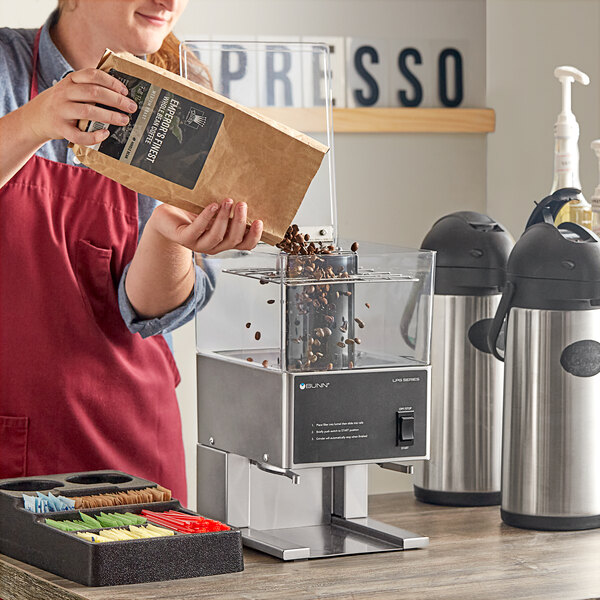Industrial Coffee Grinder Selection Guide for Professional Baristas
Industrial Coffee Mill Overview: Boost Performance and High Quality
In the competitive landscape of coffee production, selecting the best industrial coffee grinder plays a critical function in improving both effectiveness and item top quality. Comprehending the nuances of different grinder types and essential functions-- such as customizable grind settings and robust construction-- can considerably influence the last taste profile of the coffee.
Understanding Grinder Kinds
When selecting a commercial coffee mill, comprehending the different types available is crucial for optimizing both taste removal and operational efficiency. Both main kinds of grinders are blade mills and burr grinders. Blade mills make use of sharp blades that chop coffee beans right into irregular dimensions, leading to uneven extraction and possibly unwanted tastes. While blade mills are commonly a lot more inexpensive and suitable for small-scale procedures, they are normally not recommended for commercial use.

Ultimately, choosing the best sort of grinder is essential to maintaining top quality and efficiency in coffee manufacturing, making it necessary for companies to spend in high-quality burr mills for optimum results.
Secret Attributes to Consider
Choosing a commercial coffee grinder needs careful consideration of a number of crucial attributes that can considerably affect both efficiency and the total coffee experience. One of the main facets to examine is the grinding system. Burr mills are generally chosen over blade grinders, as they give a regular grind size, which is vital for optimum extraction and flavor.
One more vital attribute is the grinder's capacity. Depending on the volume of coffee you need to process, choose a version that can handle your requirements without sacrificing speed or quality. Furthermore, think about the work settings used. A flexible grinder with several settings allows you to tailor the grind dimension to various developing approaches, boosting the coffee's taste account.
The building and construction material also plays a function in sturdiness and upkeep. Stainless-steel parts typically use long life and are much easier to clean, which is necessary for keeping hygiene standards. Assess the grinder's sound level, specifically in an active café or production atmosphere, where too much noise can be disruptive. Spending in a grinder that stabilizes these functions can significantly enhance both functional efficiency and the quality of the coffee offered.
Optimizing Grinding Process
To achieve the most effective cause coffee prep work, enhancing the grinding process is necessary. The grind size dramatically influences removal, flavor, and general quality of the made coffee. Various brewing techniques require certain work sizes; for circumstances, coffee demands a fine work, while French press demands a coarse structure. Understanding the connection in between grind size and developing approach is the primary step in More about the author optimization.


In addition, keeping an eye on the grinding rate can maximize the procedure. Slower grinding frequently creates less warm, maintaining delicate flavors and fragrances. Conversely, quicker grinding might generate extreme warm, adversely influencing the coffee's quality.
Maintenance and Care Tips
Correct maintenance and treatment of industrial coffee grinders are essential for ensuring ideal efficiency and longevity. Regular cleansing is the foundation of maintenance; residue buildup can influence flavor and grinding performance. It is a good idea to cleanse the mill after each use, wiping down the exterior and getting rid of any type of coffee premises from the burrs.
Additionally, check the grinding burrs for damage. Boring burrs can jeopardize work uniformity, so they need to be replaced as required. Industrial Coffee Grinder. Regularly adjusting the mill is also crucial, as this maintains the preferred work dimension for different developing approaches
Lubrication of relocating parts must be performed according to the maker's specs, as this lowers rubbing and prolongs the life of the tools. It is crucial to utilize food-grade lubricants to make certain security and conformity with health guidelines.
Lastly, webpage maintain the grinder in a completely dry and stable atmosphere to prevent corrosion and rust. By sticking to these maintenance and treatment suggestions, drivers can enhance the performance of their commercial coffee grinders while making certain high-grade outcome and extended functional life.
Return on Financial Investment Analysis
Assessing the roi (ROI) for industrial coffee grinders is crucial for companies looking for to maximize their coffee production abilities. A comprehensive ROI evaluation helps establish the financial feasibility of buying top notch grinders, enabling businesses to evaluate the initial costs against potential gains.
Evaluate the purchase rate of the mill, including installment and any kind of needed modifications to existing infrastructure. High-performance mills commonly lead to minimized grinding time and enhanced throughput, which can significantly boost efficiency.
Additionally, take into consideration the influence on product top quality. Industrial Coffee Grinder. Superior grinders yield an even more consistent work size, which can improve taste profiles and consumer fulfillment, eventually driving navigate to this site sales. By enhancing the high quality of the final product, businesses can warrant greater pricing, bring about boosted revenue
Final Thought
In summary, a commercial coffee mill plays a crucial duty in boosting both performance and item top quality within coffee manufacturing. Inevitably, the critical financial investment in a reliable grinder contributes significantly to improved revenue and competitiveness in the coffee industry.
In the affordable landscape of coffee manufacturing, picking the ideal commercial coffee grinder plays a critical role in enhancing both performance and item high quality. The two primary types of mills are blade mills and burr grinders. Within the burr grinder group, there are level burr mills and cone-shaped burr grinders, each with its advantages. Burr mills are normally liked over blade grinders, as they provide a consistent work dimension, which is important for optimal removal and taste.
In recap, an industrial coffee grinder plays a pivotal duty in boosting both effectiveness and product quality within coffee manufacturing.